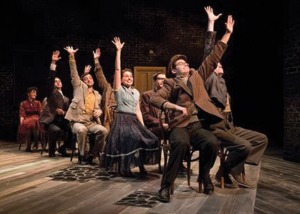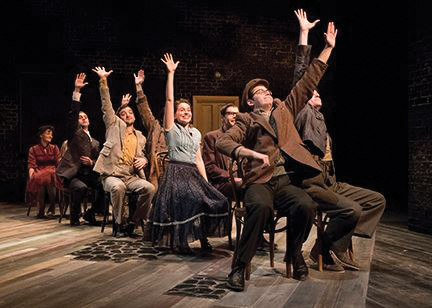
“This play will give people a chance to really notice things in the world that are transpiring, that matter, and how they have the opportunity to make a difference — it is a beautiful communal event. It’s a courageous, humane work that will inspire people,” Derek Goldman, a professor of theater and performance studies, said when asked why everyone should see the student production he directed, “Our Class.”
“Our Class,” originally written in Polish by Tadeusz Słobodzianek, tells the story of 10 classmates living in Poland on the brink of war. The characters, both Jewish and Polish, start the play as children and classmates who are very clearly close with one another. This wholesome relationship decays, however, with the rising political tensions in pre-World War II Europe. Deep divisions among previous friendships are formed, culminating in catastrophic results.
The play is told through 13 “lessons”; the characters get older as each one goes by, and their interpersonal relationships becoming increasingly volatile as their country does the same. We follow the 10 classmates Jakub, Dora, Rysiek, Zygmunt, Menachem, Heniek, Zocha, Wladek, Abram and Rachelka as they fall in love and betray each other, as they go through joy and heartbreak, and as they live and die. Each character is developed with painstaking care onstage. The audience truly gets to see their motivations and personalities, which are revealed to be more complex with each passing lesson.
Ambiguous morality is one of the most interesting aspects of the play. Even though the majority of the characters are flawed individuals who have done horrible things before the audience’s very eyes, their reasons behind such actions are presented and explained coldly; perhaps their reasons are not enough to forgive them, but they are enough to understand them. This understanding creates a gnawing pit in the stomach, as you are forced to ask yourself what you would do if thrown into the same situation.
This horror is one of the main emotions evoked by the play. “I knew that the ask was very large, that it would require the actors to go to some really difficult places,” Goldman said. The play comes with content warnings against multiple instances of physical and sexual assault, which occur throughout the duration of the production — these warnings should be heeded. There are stomach-churning graphic scenes that could be upsetting for some, and the suspenseful atmosphere of the play is enough to keep the heart pumping, even in scenes where the dialogue clearly foreshadows a new unfolding horror.
Dread builds up slowly throughout the course of the play, so subtle in the beginning that the dread is only recognizable about three-quarters into the first act. This effect is achieved by the stellar acting of every cast member. Not only are their characterizations next to perfect, but the physicality each brings to their role is stunning.
The play is masterfully choreographed: Everything, down to the way the characters move onstage, seems to be both carefully managed and natural at the same time. Every small detail furthers the audience’s connection with a character and deepens the understanding of their personalities — the high set of shoulders, the arms holding an imaginary baby, the slow extending of a hand toward another.
The haunting atmosphere of the play is amplified by the use of a capella singing throughout the lessons, starting with the bright chanting of schoolchildren running around in circles and building up into sad, moving ballads as the characters grow up and experience pain and loss.
“Our Class” is a timeless play that poses countless psychological questions to the viewer, but the production seems especially important to watch in modern times. With the premiere of the play just a week after the antisemitic shooting at a Pittsburgh synagogue, the horrible violence perpetuated against those of Jewish descent in the play is unfortunately reflected in the real world.
“It has entirely different echoes right now,” Goldman said. “The world is shifting in ways that were really making me think about this play. In Poland in 2012, this story and stories like this were being highlighted and embraced; currently, there’s been a turn where these histories, which raise complicated questions about complicity, are being more suppressed.”
The amazingly professional student production truly takes a toll on its audience, who are sure to leave the Gonda Theatre emotionally exhausted and full of dull rage as more and more unfortunate events are piled on the characters we root for. Amid all the sadness and dismay, however, hides the true reason for consuming such depressing content: The story is a part of our history that has happened before and is happening again.
Art should mean something. Art should help build bridges between communities and bring awareness to social issues, uniting people instead of dividing them. “Our Class” does all of this with the utmost care and gracefulness; the production is, quite simply, a must-watch.




















